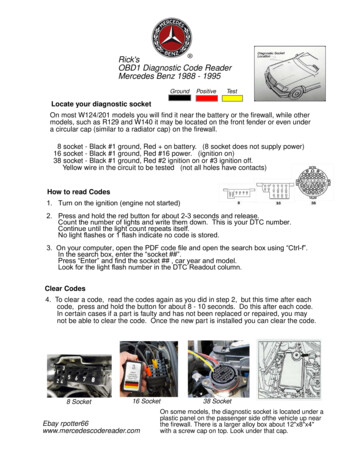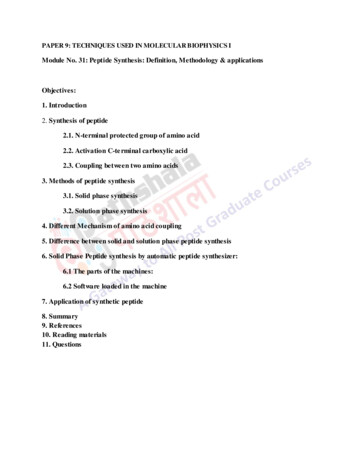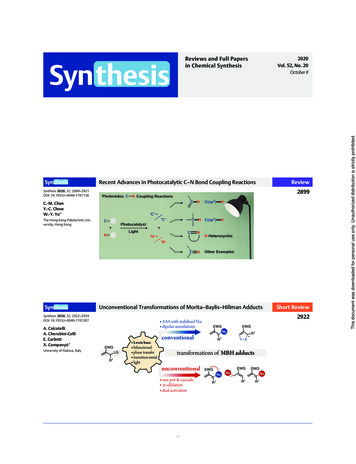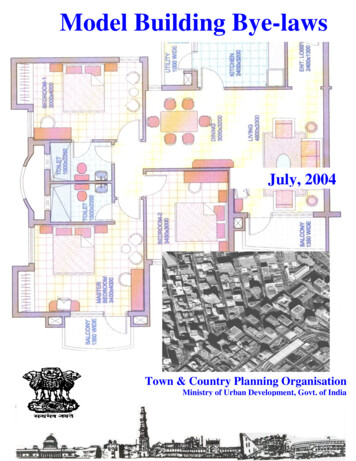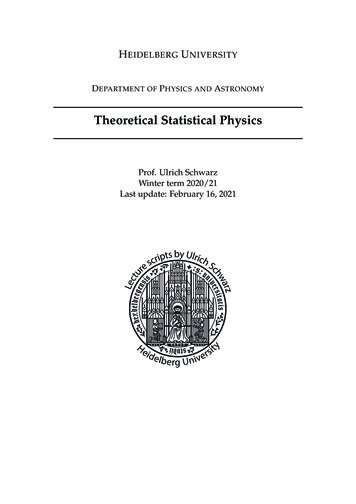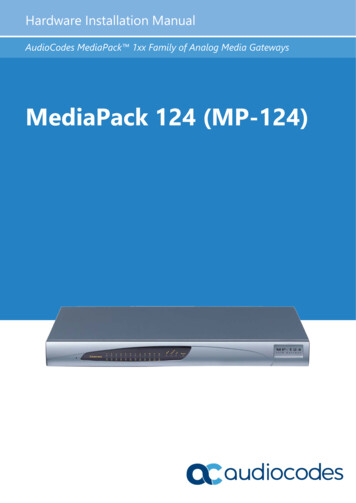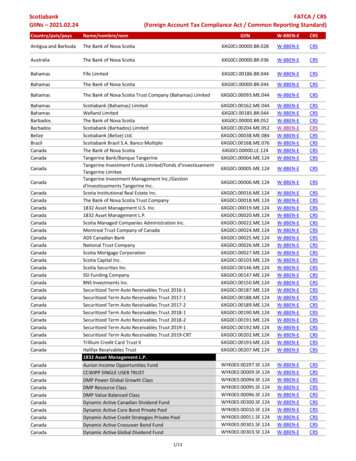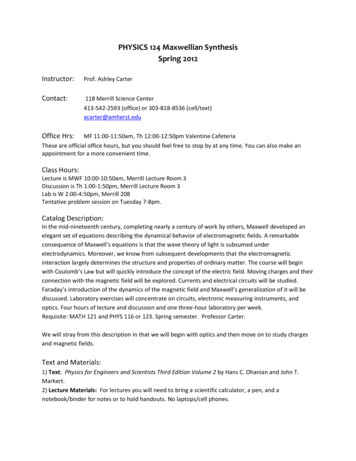
Transcription
PHYSICS 124 Maxwellian SynthesisSpring 2012Instructor:Prof. Ashley CarterContact:118 Merrill Science Center413-542-2593 (office) or 303-818-8536 (cell/text)acarter@amherst.eduOffice Hrs:MF 11:00-11:50am, Th 12:00-12:50pm Valentine CafeteriaThese are official office hours, but you should feel free to stop by at any time. You can also make anappointment for a more convenient time.Class Hours:Lecture is MWF 10:00-10:50am, Merrill Lecture Room 3Discussion is Th 1:00-1:50pm, Merrill Lecture Room 3Lab is W 2:00-4:50pm, Merrill 208Tentative problem session on Tuesday 7-8pm.Catalog Description:In the mid-nineteenth century, completing nearly a century of work by others, Maxwell developed anelegant set of equations describing the dynamical behavior of electromagnetic fields. A remarkableconsequence of Maxwell’s equations is that the wave theory of light is subsumed underelectrodynamics. Moreover, we know from subsequent developments that the electromagneticinteraction largely determines the structure and properties of ordinary matter. The course will beginwith Coulomb’s Law but will quickly introduce the concept of the electric field. Moving charges and theirconnection with the magnetic field will be explored. Currents and electrical circuits will be studied.Faraday’s introduction of the dynamics of the magnetic field and Maxwell’s generalization of it will bediscussed. Laboratory exercises will concentrate on circuits, electronic measuring instruments, andoptics. Four hours of lecture and discussion and one three-hour laboratory per week.Requisite: MATH 121 and PHYS 116 or 123. Spring semester. Professor Carter.We will stray from this description in that we will begin with optics and then move on to study chargesand magnetic fields.Text and Materials:1) Text: Physics for Engineers and Scientists Third Edition Volume 2 by Hans C. Ohanian and John T.Markert.2) Lecture Materials: For lectures you will need to bring a scientific calculator, a pen, and anotebook/binder for notes or to hold handouts. No laptops/cell phones.
3) Laboratory Manual: The manual will be passed out the first day of lab. In addition, the pdf versionwill be available on the website.4) Laboratory Notebook: You will be given a laboratory notebook on the first day of lab. Thedepartment will then charge your student account for the cost of the notebook.Lab Section:The labs are an integral and important part of the course. For each lab you will be required to do somepreparatory homework before the lab. During the lab, you will complete all of the sections of the lab inyour lab notebook. You should anticipate spending the full 3 hours (2:00 – 4:50 pm) to complete the lab.At the end of the lab class you will be evaluated by an “exit interview” for all informal labs. For formallabs you will write a formal lab report. There are three formal labs throughout the semester.To complete the lab you must attend the lab and complete all of the sections. You must alsopass the informal exit interview or formal lab report. You must complete all of the labs to pass thecourse. That means that you cannot get a zero on your lab notebook or formal report for any reasonincluding missing the deadline or academic dishonesty. You also cannot skip any labs for any reason orturn in any formal lab reports past the deadline. This is a departmental rule and will be strictly enforced.Any deviations from this policy must be approved by your class dean and physics department.Materials:You will be provided with a laboratory notebook at the first lab meeting. You will complete the labsections in your notebook and turn in the notebook at the end of the lab period. You should not take thenotebook home with you unless you are instructed to do so. You will also be given a hard copy of thelaboratory manual. A pdf of this manual can also be found on the course website should you lose yours.You must bring the manual to lab each week.Lab Calendar:Please check the lab calendar below to make sure that you will be available for all of the labs. If you aregoing to miss a lab for a scheduled event, you must notify me during the first week of class so that I canreschedule the lab for you. Remember that you must complete all the labs to pass the course.Grading:Your grade for the course will be based on your homework/quiz grades, lab grades, and exam grades.You will also be expected to participate during lecture and problem sessions.Homework/Quizzes:In addition to reading a chapter a week, you will be expected to complete roughly one homeworkassignment a week for a total of 12 assignments. Homework assignments are primarily a teachingexercise to prepare you for the exams. You should complete each assignment and show your work. Irecommend that you complete the unstarred (more straightforward) problems on your own, however,you are encouraged to work in teams for the more difficult, starred problems. You will not be asked toturn in your assignment. Instead I will pick one problem from the assignment for you to completeduring a quiz in the discussion section. If you are going to miss a discussion section let me know duringthe first week of class so I can schedule an alternative time for you to take the quiz. Otherwise I willnot schedule makeup quizzes unless you have a doctor’s note or your class dean’s permission. The 12
quizzes will be out of 10 points each and worth 30%-40% of your grade. During the quiz you will not beable to look at your book or notes. Tentative homework assignments are as follows: (Other problemsmay be added in lieu of the problems shown here at my discretion.)Assignment 1: (Quiz on Feb. 9) Ch.34 – Q7,Q16,5,6,24,29,39,47,48,75,92Assignment 2: (Quiz on Feb. 16) Ch.35 –Q21,Q33,8,10,15,16,33,49,52,69,78Assignment 3: (Quiz on Feb. 23) Ch. 22 – Q4,Q11,5,12,32,40,48,49,53Assignment 4: (Quiz on Mar. 1) Ch. 23 – Q9,Q10,5,6,23,31,50,60,75Assignment 5: (Quiz on Mar. 8) Ch. 24 – Q9,Q12,4,12,16,25,35,39,58,76Assignment 6: (Quiz on Mar. 15) Ch. 25 – Q13, Q22, 6,20,25,36,38,44,53,Assignment 7: (Quiz on Mar. 29) Ch. 26 – Q1,Q10,3,14,22,29,39,57,62Assignment 8: (Quiz on Apr. 5) Ch. 27 – Q10,Q11,12,22,40,52,55,62,65Assignment 9: (Quiz on Apr. 12) Ch. 28 – Q11,Q13,1,6,15,22,29,37,58,66,81Assignment 10: (Quiz on Apr. 19) Ch. 29 – Q1,Q6,10,18,26,37,43,49,60,Assignment 11: (Quiz on Apr. 26) Ch. 30 – Q3,Q7,10,16,18,27,32,42,47,55Assignment 12: (Quiz on May 3) Ch. 31 – Q6,Q18,3,15,22,29,43,47,58,60Exams:There will be three exams during the course and a final. Times are tentative. The exams will not becurved, but they will be written such that the mean of the exam should be around 85%. Each exam willbe worth 150 points or about 15% of your grade, with the math review take home exam being worthless. You will be allowed to have the formula sheet from the appendix for each in class exam.First Exam: Take home exam, Math Review, January 27-30.Second Exam: Ch. 34-35, Optics, Wednesday, Feb. 22, 2-5 pm.Third Exam: Ch. 22-25, Electrostatics, Wednesday, March 28, 2-5 pm.Final Exam: Ch. 26-31 Electrodynamics and Magnetism, Registrar scheduled.Labs:There will be five labs throughout the semester that will each require two lab periods to complete. Youwill record your data for the lab in a lab notebook. Each lab in the notebook will be graded out of 20points. You will also complete four formal lab reports that are each worth 10 points. The lab grade willbe worth about 15% of your final grade. Due dates and schedule below.Formal Report 1: Optics, due Monday, Feb. 20, midnight.Formal Report 2: Resistors, due Monday, April 2, midnight.Formal Report 3: Capacitors, due Monday, April 23, midnight.Formal Report 4: Inductors, due Friday, May 4, 5 pm.
Apr25-Apr2-MayLab TopicNo LabOptics IOptics II - FormalEM Intro IExam 2 - OpticsEM Intro IIResistors IResistors II - FormalSpring BreakExam 3 - ElectrostaticsCapacitors ICapacitors II - FormalInductors IInductors II - FormalNo LabRubric:Your grade in the course will be based on your quiz grades, exam grades, lab grades, and participation. Iexpect most students to get very close to 100% on the quizzes, the math take home exam, andparticipation. The lab section of the course is fairly difficult and most students will average an 80% for allthe lab assignments. The class is not curved, but I expect that the average exam grade will be an 85%,setting the mean right at the B /A- region. I know that some students are very worried about theirgrades, but my goal in using this system is to hopefully focus your attention on the physics and howthings work while putting less emphasis on grades.INTELLECTUAL RESPONSIBILITY:Each semester I am amazed at how many violations there are of the academic code. Many violations arenot intended, some are not even helpful to the student’s grade. To limit the number of violationHomework/Quiz – You are encouraged to work with other students on your homework, butyou should be able to do each homework problem on your own without help. The in class quizzes will beclosed note and book. You will need to bring a calculator (cell phones or other electronic devices are notallowed) and writing utensil. You will be given a blue book, other scratch paper is not allowed. Copying asolution from another student or from a published source will be considered a violation of theintellectual code. If you do remember off the top of your head verbage from a particular source, youmust cite that source.Lab work – Discussion and cooperation between lab partners is encouraged during the labsession and both partners should share equally in the collection of data. However, each student mustkeep a separate record of the data and do all calculations independently. Every year this “together butseparate” policy causes problems and is easy to misinterpret. The reason that the physics departmentinsists on this is that science is almost always a team effort, so working as a team is preferred. However,
a student’s grade in the course is not a team effort, so for pedagogical reasons each student must showtheir own work. This means that Lab reports must be written entirely by one student and mustrepresent that student’s own understanding of the lab. Note: Even though you have a partner duringthe lab you must turn in separate formal reports and separate lab notebooks. The other problem thatcomes up in the lab section has to do with the integrity of the data. Use of any data or calculations otherthan one's own and "fudging" of data (adjusting a number to something other than what you observed)are violations of the intellectual code.Exams – You will not be allowed to collaborate with anyone during an exam or use any outsidesources. What you submit must be entirely your own work. The take home exam will be open book andopen note. Solution manuals (online or published) are still prohibited. In class exams are closed bookand note. You will be allowed the formula sheet from the appendix on the exams.
Discussion is Th 1:00-1:50pm, Merrill Lecture Room 3 Lab is W 2:00-4:50pm, Merrill 208 Tentative problem session on Tuesday 7-8pm. Catalog Description: . will record your data for the lab in a lab notebook. Each lab in the notebook will be graded out of 20 points. You will also complete four formal lab reports that are each worth 10 points.
